“Their whole lives were ahead of them… or should have been”: the children killed by the Russian missile that hit a Dnipro apartment block
"People are more precious than gold" reads the inscription on a card placed next to the flowers and votive lamps that locals in Dnipro have been bringing to the site of the high-rise building destroyed by a Russian missile. Most of the offerings there are toys, in memory of the children killed by Russia. So far, six children are known to have died in the attack.
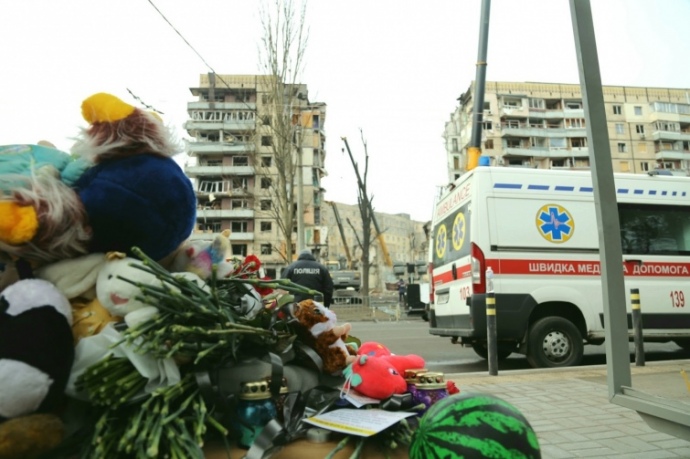 People bring toys and flowers to the site of the missile attack in Dnipro.
People bring toys and flowers to the site of the missile attack in Dnipro.
Photo: Viktoriia Roshchyna
People have been visiting the scene of the tragedy to honour the memory of the victims. "The flower of the nation," they say through their tears. Volunteers and concerned citizens continue to raise funds to help the relatives of the victims, to bring them food and warm clothes, and to arrange places to stay for those who are now homeless. In this article, we tell the stories of the children whose lives were cut short by the Russian missile on 14 January.
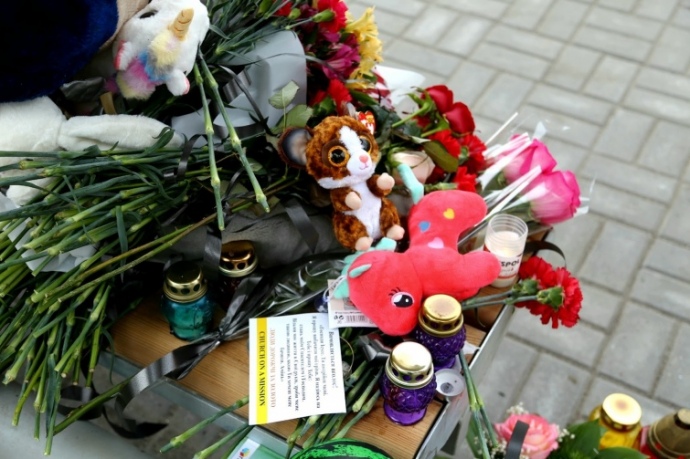 People bring toys and flowers to the site of the missile attack in Dnipro.
People bring toys and flowers to the site of the missile attack in Dnipro.
Photo: Viktoriia Roshchyna
Mykyta Zelenskyy, 11 months
"This is the last video that Katia sent us," Mykola Kulak says with tears in his eyes. Mykola is the father of Kateryna Zelenska, a survivor of the Russian missile strike on Dnipro. "She sent a video of them playing with Mykyta, and then the connection was cut off." "The last thing she had time to say was, 'Mum, I love you!'...
We thought those were her last words," adds Kateryna's mother, Oksana.
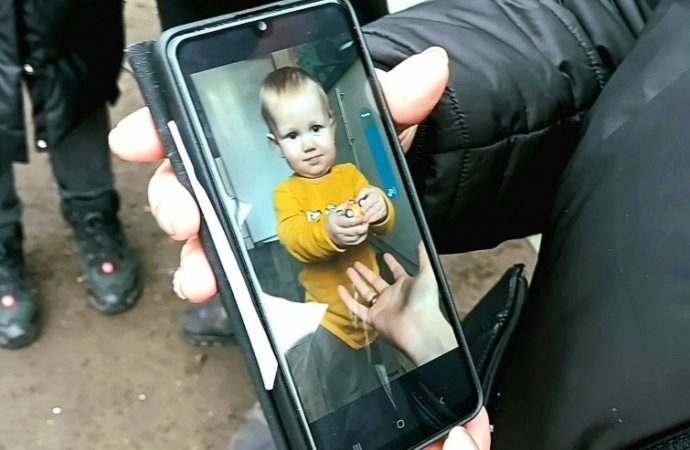 Mykyta Zelenskyy's grandmother shows us the last video of her 11-month-old grandson. Photo: Viktoriia Roshchyna
Mykyta Zelenskyy's grandmother shows us the last video of her 11-month-old grandson. Photo: Viktoriia Roshchyna
Kateryna had lived on the fourth floor of the infamous high-rise building for three years, with her husband Oleksii (they met when they started primary school and had been together ever since) and her son Mykyta, whose first birthday would have been on 29 January. All three of them were at home that evening, but only Kateryna survived.
And that was a miracle.
 Kateryna Zelenska with her son Mykyta. Photo: social media
Kateryna Zelenska with her son Mykyta. Photo: social media
"If miracles exist, then this is a miracle," says emergency worker Roman Hirych, who pulled Kateryna out of the rubble. The first time the rescue workers heard her voice was nine hours after the missile strike - at midnight.
They then called for a minute of silence to find out exactly where she was. It was not until the following afternoon that they got her out. For almost a day, Kateryna lay under the rubble.
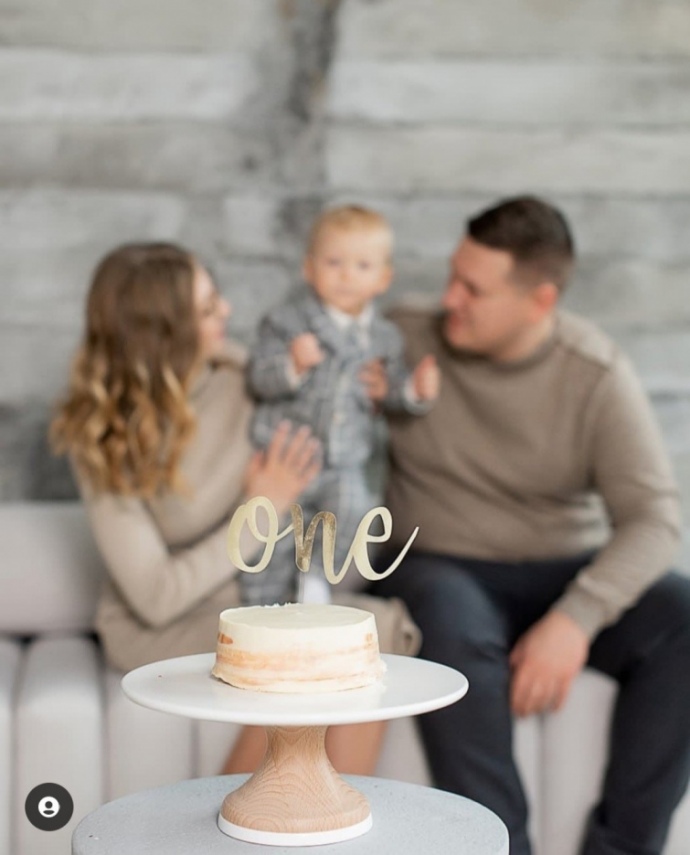 Kateryna and Oleksii Zelenskyy with their son Mykyta.
Kateryna and Oleksii Zelenskyy with their son Mykyta.
Photo: social media
"She was lying there in the cold, and we'd filled it all with water too. When we lost contact with her in the morning, we thought she was dead. I can't imagine how she survived," says Hirych.
Kateryna's parents say that her physical health is already back to normal. She only has a slight cough, and she constantly asks about her son. "She's probably still spaced out with the sedatives right now, so she's not too agitated, but she's constantly asking us about her son and about Oleksii," Kateryna's mother says.
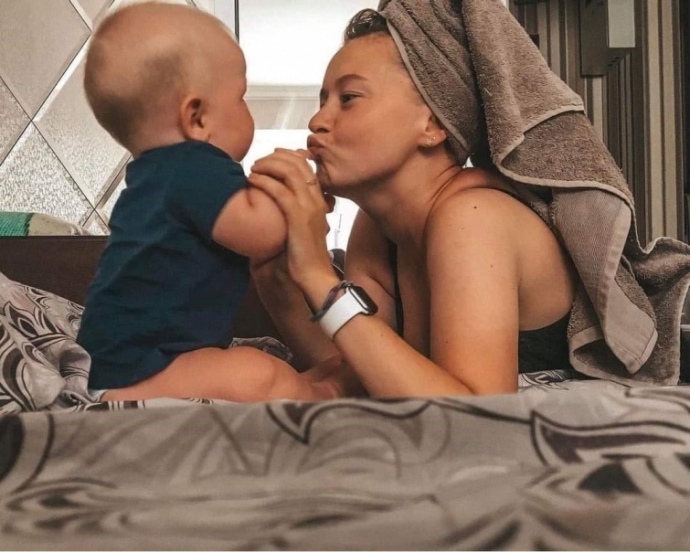 Kateryna Zelenska with her son Mykyta. Photo: social media
Kateryna Zelenska with her son Mykyta. Photo: social media
Kateryna's father adds that the couple lived "soul to soul". "They understood each other with half a word.
And Mykyta was such a good boy... if you told him not to run, he'd come and sit down quietly next to you. He was a little ray of sunshine..." he says tearfully. It was not until 17 January that emergency workers were able to retrieve the bodies of the dead man and child.
During the identification process, Kateryna's parents wept, shouted and cursed Russia.
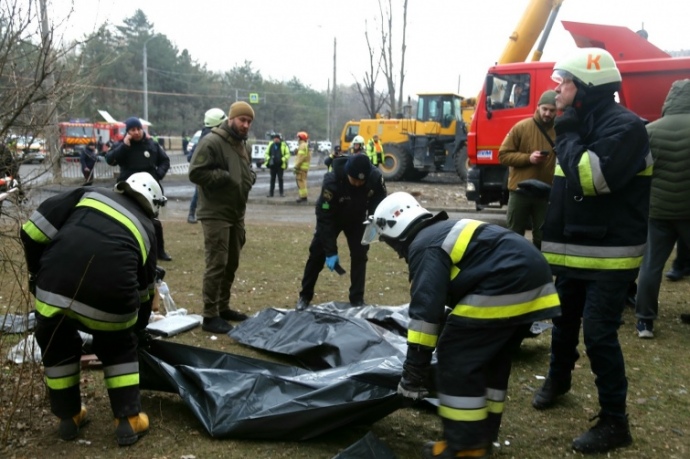 Rescue workers remove the bodies of Mykyta and Oleksii Zelenskyy, who were killed in the missile strike.
Rescue workers remove the bodies of Mykyta and Oleksii Zelenskyy, who were killed in the missile strike.Photo: Viktoriia Roshchyna
"See what kind of 'Bandera' those Russians found!" Kateryna's father Mykola shouts with tears in his eyes as he shows us a photo of his little grandson. [Stepan Bandera was involved in the Ukrainian nationalist movement in the 1930s, later leading its radical wing, and is widely regarded as a "Nazi leader" in Russia - ed.] "Damn you Russians, I hope you all die. I curse them and I will curse them until the last days of my life!
There is no forgiveness for them!"
Mariika Lebid, 15
Fifteen-year-old Mariia Lebid (known by her pet name, Mariika) was also killed in the Russian missile strike on Dnipro.
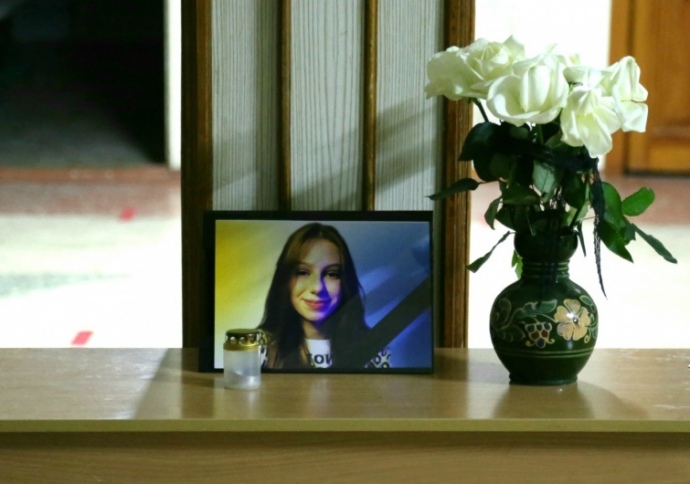 A photograph of Mariika Lebid with a black ribbon in the corner is displayed in the school where she studied.
A photograph of Mariika Lebid with a black ribbon in the corner is displayed in the school where she studied.Photo: Viktoriia Roshchyna
Mariika Lebid was training to become a professional musician and ballroom dancer. A straight-A student, she was actively involved in school life and had been elected president of the student council. Mariika's mother brought her up on her own.
Mariika also had an older brother who did not live with them. Her relatives have so far refused to talk to journalists. A photograph of Mariika - with a washed-out Ukrainian flag for the background, a black ribbon cutting across the picture's corner - is displayed by the main entrance of the school where she studied.
Her teacher, Oksana Matusevych, has agreed to talk to Ukrainska Pravda, although she admits to finding it very difficult.
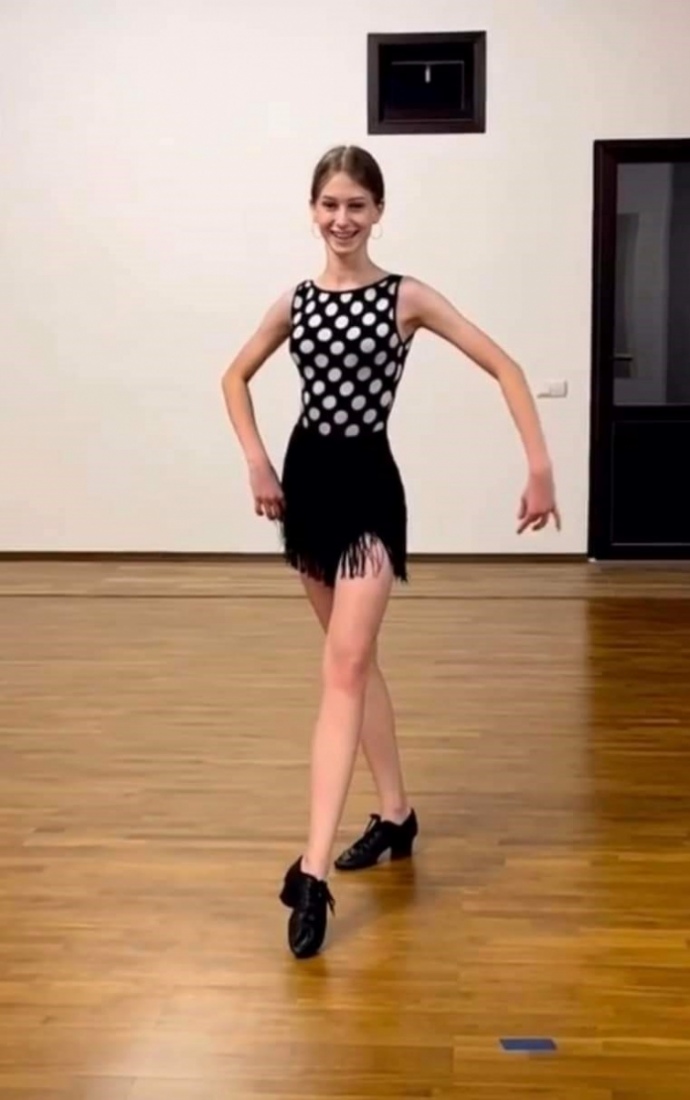 Mariika Lebid at her dance school. Photo: social media
Mariika Lebid at her dance school. Photo: social media
"She was a flower of our nation, our little star," Mariika's teacher says in a trembling voice. "She was exceptionally polite and intelligent; a true beauty and a top student.
I can't say anything bad about this child. 'The best of us' - that's what I had written on her funeral wreath. Some kids have flaws and faults, but she had none..." Ms Matusevych says Mariika never had problems at school.
She was friendly, motivated, and very patriotic. "Lately she wouldn't speak Russian at all," Mariika's teacher says. "When she joined online classes, her video background would be a Ukrainian flag, or an image of Moscow being consumed by fire."
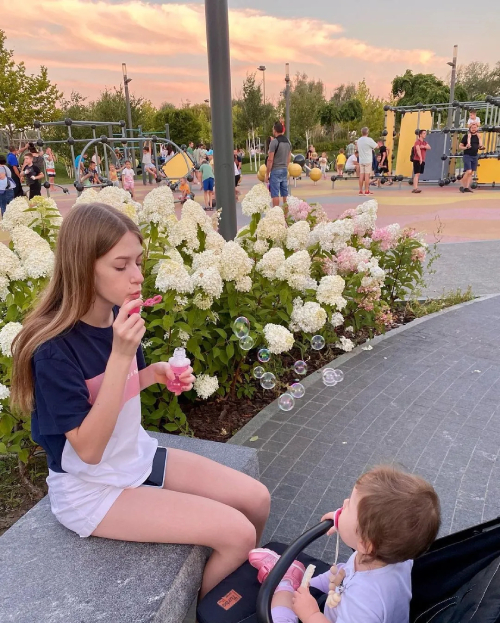 Mariika Lebid was a top student and was firmly pro-Ukrainian. Photo: social media
Mariika Lebid was a top student and was firmly pro-Ukrainian. Photo: social media
Ms Matusevych said that Mariika's death has shocked all her classmates.
Most of them missed the latest online class; those who did attend were mostly silent. "The pain is terrible, and it will be felt for a long time. The kids are experiencing denial now: they refuse to believe it.
Of course, we'll be offering counselling," Ms Matusevych says, adding that this is not the first death her class has had to deal with: the mother of one of the pupils was killed in a recent Russian attack on the city. "My manners and my position prevent me from swearing, but I have nothing but curses in me, because I hate Russia with my whole heart! They spent all these years telling us tall tales about being our 'older brother', but I know history well.
I know that Ukraine is a country that goes back to a time before Russia existed and has spent all this time being completely subjugated by the Russian Empire," the teacher says. She concludes our conversation by saying that she now advises her students never to ignore air-raid sirens. "Because everything happening right now is a terrible lottery..."
Maksym Bohutskyi, 17
The Russian missile also killed 17-year-old Maksym Bohutskyi.
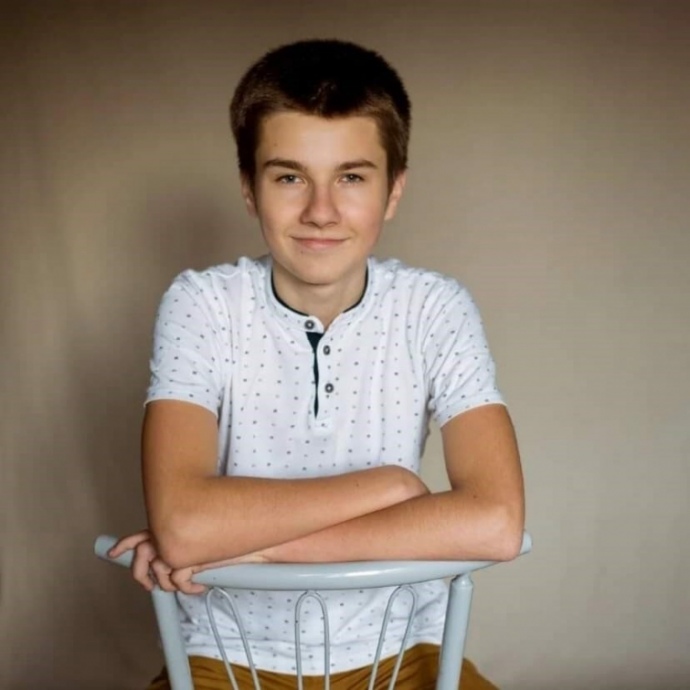 Maksym Bohutskyi was home alone when the Russian missile hit his apartment block in Dnipro
Maksym Bohutskyi was home alone when the Russian missile hit his apartment block in Dnipro
Maksym's father Dmytro told Ukrainska Pravda that on the day of the Russian missile strike, he and his wife had gone to a relative's birthday party; Maksym had been planning to meet his friends at 16:00 that day. Air-raid sirens were sounded at 15:00 and various sources reported that two missiles were approaching Dnipro.
"I called him and asked him to wait a bit as he'd have to walk for 20 minutes [to meet his friends]," Maksym's father says, occasionally breaking into tears. "He said, 'Okay, I'll sit it out at home.' Those were his last words. The missile hit the building at 15:30 and he hasn't picked up his phone since," Dmytro recalls. At 15:40 he got a call from his nephew, who was walking past the apartment block where the Bohutskyi family lived.
He said the section of the building their flat was in had been destroyed. "I didn't understand what he was saying, or didn't want to believe it. But Maksym was no longer responding to our calls," Dmytro says. "We took the first taxi we could and got to Peremoha [Victory, the name of the residential complex hit by the Russian missile - ed.] as fast as possible. Then the most difficult 48 hours of our lives started.
Those hours felt like months."
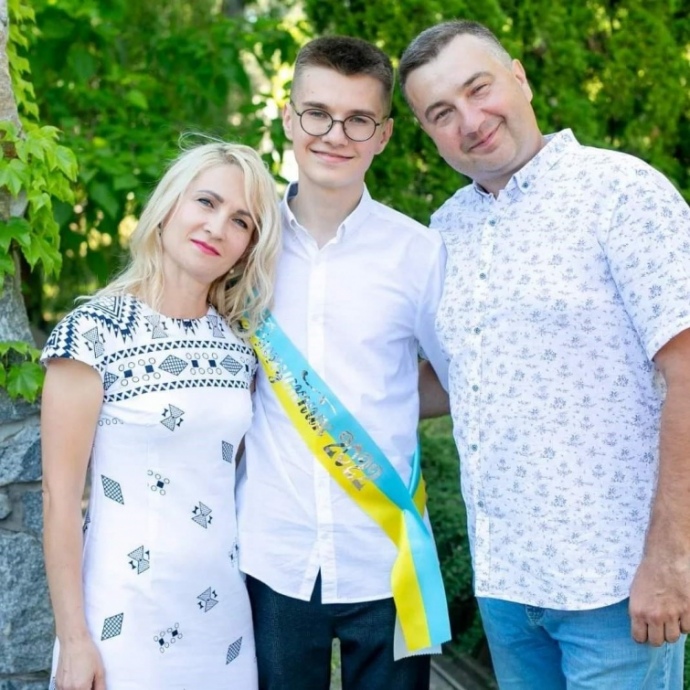 Maksym Bohutskyi (centre) with his parents. Photo: social media
Maksym Bohutskyi (centre) with his parents. Photo: social media
The Bohutskyi family lived on the seventh floor. Almost everyone who lived on the same stairwell was killed in the attack.
"[Maksym] was a bright boy who never caused any trouble. He had a sunny nature and a wonderful sense of humour. We are happy we had a son like him," Dmytro says.
Last year, Maksym started at the Dnipro University of Technology. He found studying easy and enjoyed it. "He knew geography really well and we loved to travel together.
During our journeys we'd listen to audiobooks or just play 'cities'; his extensive geography knowledge meant each game lasted forever. He loved football and played with a local club. He ordered a pair of boots he really loved a week ago and couldn't wait to wear them outside," Maksym's father says, adding through tears, "This is one of those cases where his whole life was ahead of him and everything promised to be all right...
Everything should have been all right." Dmytro does not want to talk about Russia, but says, "I think they are not humans. I don't understand why anyone would go to the zoo and talk to a caged hyena.
The hyena must stay in its cage. I have no illusions about any sort of negotiations. Build a concrete wall [between Russia and Ukraine] and let them all stew in their own juice.
We just have to keep living, to defend our freedom. We are a wonderful nation. There is no doubt we will win."
Dmytro also expressed his admiration and gratitude for the Ukrainians who were clearing away the rubble after the first missile hit the apartment block, even before the threat of another strike had been cleared. "Everyone who lived in the building was trying to help however they could, with whatever tools they could find; they started clearing away the rubble... No one was afraid of a second missile.
An hour later, firefighters were shifting concrete slabs with their bare hands. The police, the military... Everyone was working together, like clockwork.
No one remained indifferent."
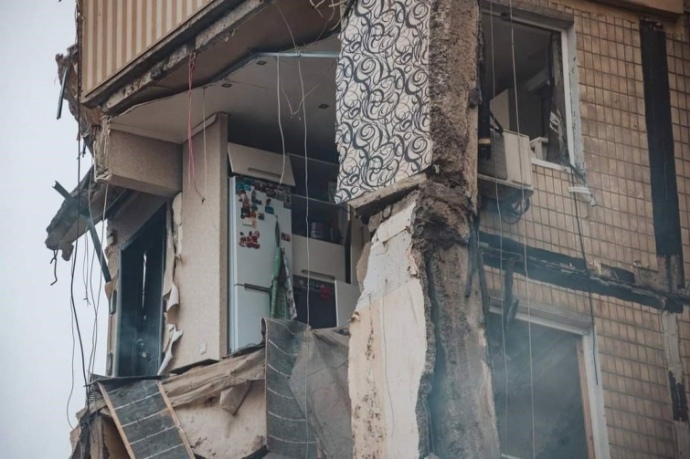 The Bohutskyis' destroyed apartment. Photo: Dmytro Bohutskyi
The Bohutskyis' destroyed apartment. Photo: Dmytro Bohutskyi
Dmytro shows us the remnants of his destroyed apartment. "This is our kitchen.
There's a green apron hanging on the fridge. It was a gift from Maksym. Someone brought it over to us today.
Now it will remind us of him..."
Makar Huz, 18 months
Eighteen-month-old Makar Huz was also killed in the missile strike on the apartment block, along with his mother Anastasiia and father Dmytro.
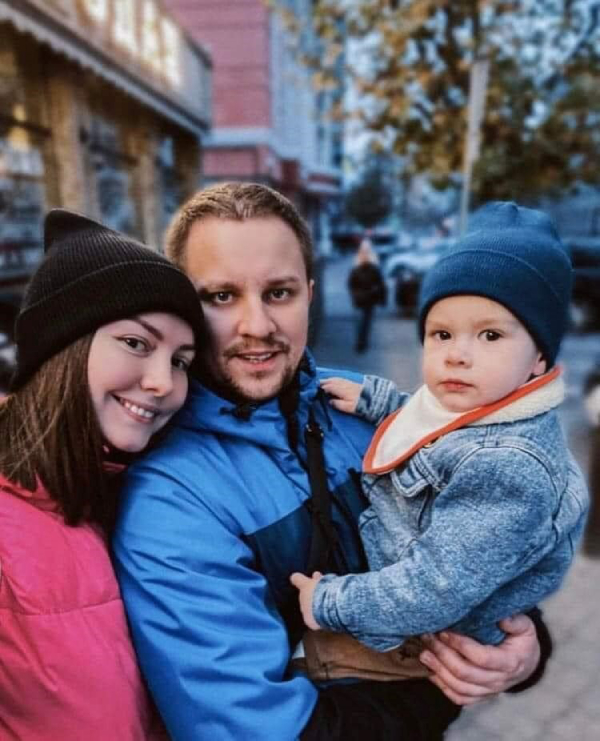 18-month-old Makar Huz was killed in the Russian missile strike on Dnipro, along with his mother and father
18-month-old Makar Huz was killed in the Russian missile strike on Dnipro, along with his mother and father
Anastasiia and Dmytro were from the now-occupied city of Tokmak, Zaporizhzhia Oblast. Dmytro Hak, a colleague of Anastasiia's, told us that she was involved in sport there, and her husband worked for the police. Anastasiia came to Dnipro in 2012 to study at the University of Physical Education.
She lived in student accommodation and worked at a club as an acrobatics coach. "She worked at my club until 2021," says Hak. "In 2018, she married Dmytro and he moved to Dnipro, and in 2021 they had little Makar, whose body has not yet been found." According to Hak, the family had moved to the high-rise building on Peremohy Street a week before the tragedy.
After the missile strike, relatives reported that the family had not been in touch and hoped for a miracle. But it didn't happen. "Acrobatics coach Anastasiia Ihnatenko and her family have been killed," her colleague wrote. "For eight years, Nastia has been a part of our club: a caring coach, an attentive teacher, and a judge at national level who was respected and loved not only in Dnipro, but across Ukraine.
On behalf of all the coaches of Ukraine, I express my deep sorrow and send words of support to her family and friends. Eternal memory!"
Leila Frantseva, 13, and Mykhailina Frantseva, 3
Two sisters, 13-year-old Leila and 3-year-old Mykhailina Frantseva, were killed in the attack together with their mother Oksana. The family lived on the fifth floor of the apartment block.
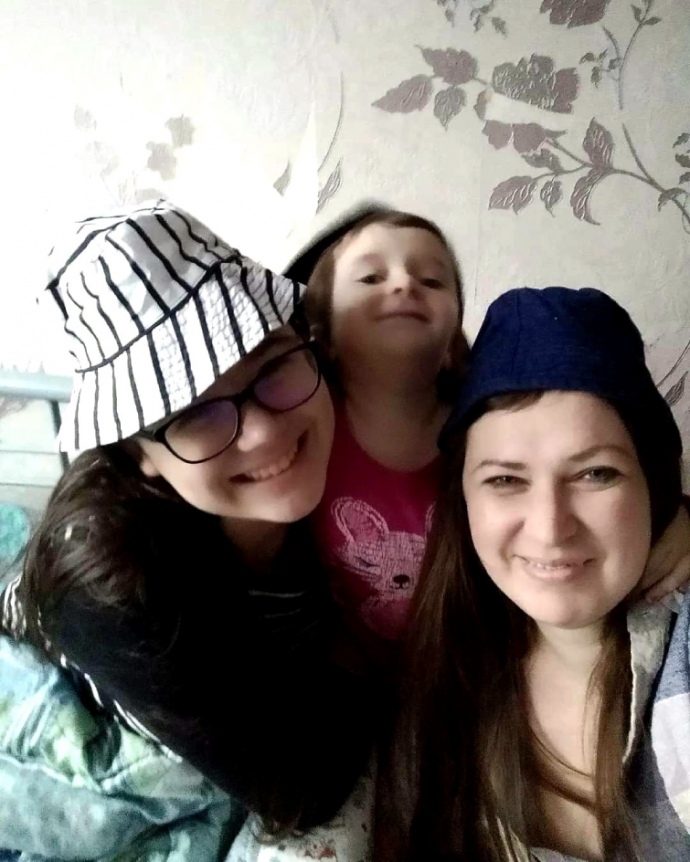 Leila, Mykhailina and Oksana Frantseva were killed in the Russian missile strike on Dnipro
Leila, Mykhailina and Oksana Frantseva were killed in the Russian missile strike on Dnipro
On 17 January, emergency workers announced that the search and rescue operations at Peremohy Street in Dnipro were complete.
They established that 45 people were killed, 79 injured and 39 were rescued. About 20 people are still missing. Emergency workers say some of the bodies could have been torn apart by the powerful impact and some could have been burned.
The remains that were found have been sent for expert examination. Rescue workers have not ruled out that some people who are being searched for could be alive. "Some of the people we thought were missing contacted us to say they were alive, just in another place. So there is hope," rescue worker Serhii Korinnyi tells us.
The blood of the murdered children will always remain on the hands of the Russian Federation, and it must be brought to justice for these crimes.
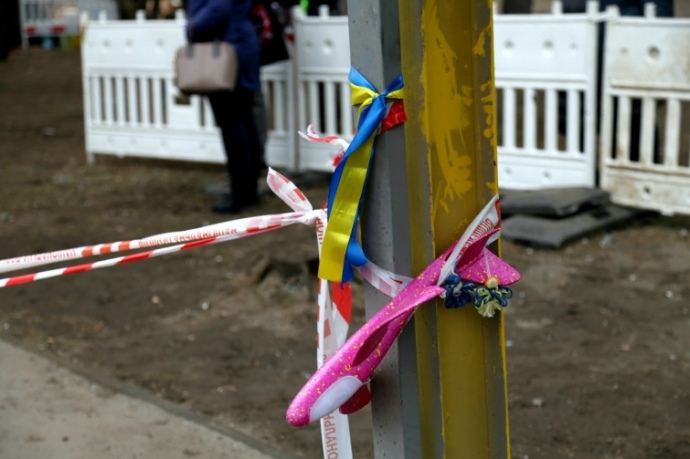 At the site of the missile strike in Dnipro. Photo: Viktoriia Roshchyna
At the site of the missile strike in Dnipro. Photo: Viktoriia Roshchyna
The families have lost people who were very precious to them, but they have also lost their homes, their cars, their documents. Though the cost of burial and replacement housing is partially or completely covered by the state, relatives and volunteers are appealing for financial help for the victims.
The Bohutskyi family: 4149 6090 0248 5094 Bohutskyi Dmytro The Frantsev family: 4149 5100 6690 2059 Frantsev Oleh The Huz family: 5168 7422 4247 8190 Olha Ihnatenko
5168 7554 5214 3254 Oleksii Ihnatenko The Lebid family: Monobank fundraising Viktoriia Roshchyna, UP.Zhyttia journalist
Translated by Yelyzaveta Khodatska, Olya Loza, Yuliia Kravchenko
Edited by Teresa Pearce